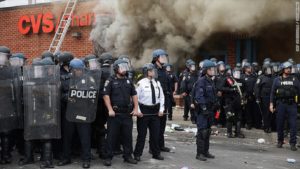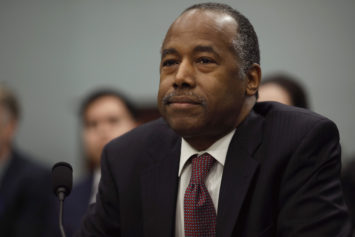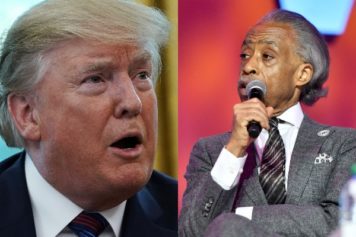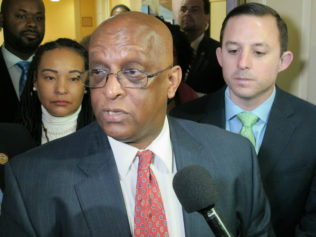As the city of Baltimore awaits a verdict in the trial of William Porter, the first of six police officers involved in the death of Freddie Gray, the wrong lessons are being learned. Rather than address the circumstances that led to the death of a 25-year old Black man in police custody, and the attendant circumstances of deprivation and injustice facing Black Baltimore, the city chooses instead to focus its attention on quieting the voice of student protest. As a result, criminals are being sought, or created, where they do not exist, as those protesters accused of damaging property face more prison time than those cops who actually took Black life.
And so we must ask, what is Black life worth, anyway? And is it as valuable as a CVS store?
As Clare Forma reports in The Atlantic, the police, stinging from criticism of its handling of protests in April, is reaching out to the community and showing it is prepared to respond regardless of the verdict. Meanwhile, activists intend to react and make their voices heard.
“We have no way of predicting things, but all I can say is the underlying structural problems that led to the uprising in April, those things have not changed,” Sharon Black, an organizer with the Baltimore People’s Power Assembly, told The Atlantic. “The verdict will reverberate widely because people are looking right now to see if the system is responding when it is challenged. You never know what will be the spark that will cause people to do something or start another rebellion.”
Black said that while there is a negative connotation to rioting, activists regard the events following the death of Freddie Gray as a rebellion.
“I find it really hard to equate the life of a young man with a broken police cruiser window or with a building burning down. The anger was so deep that it exploded in rage. And now, people want action.”
Meanwhile, rather than prevent and eradicate the criminality of police officers, city officials prefer to obsess over the political reactions of the youth to the very violence and injustice they see around them. Is there not a deficiency of leadership here? Writing for the Washington Post, Emma Brown reports that the Baltimore schools plan to seek disciplinary action against students who protest the verdict, including those who participate in walkouts.
“Students need to understand that we support their right to express their emotions, and that we will facilitate opportunities for them to do so appropriately,” wrote Baltimore City Schools chief executive Gregory E. Thornton in a letter to parents, families and community members. “However, we need to make it clear that student walkouts, vandalism, civil disorder, and any form of violence are not acceptable under any circumstances and that students who participate in such behaviors will face consequences.”
Family Community Letter by emma brown
Although the letter claims it is not dampening the free speech rights of young people, it also warns students not to engage in forms of protest, and paints such activity as unsafe and irresponsible. But is it suitable for a city to maintain an unsafe environment for its children, who face violence and death from police, and are funneled into a school-to-prison pipeline? And is it responsible to criminalize students for protesting the dangerous police state environment created for them, while not reforming— or rather, replacing—the system that creates the danger?
Susan Goering, executive director of the ACLU of Maryland, said in a statement that while those who break laws must face consequences, students cannot be punished for activity which occurs outside of school, as this would amount to “chilling legitimate, peaceful protest activity.” Goering added that the letter “assumes that students only want to express their emotions, not rational views about the conduct of police and lack of accountability, and it misses an opportunity to affirmatively engage students who want to be politically engaged on these issues.”
As students face sanctions for speaking their mind, some protesters caught up in the uprising face greater punishment for the destruction of property than criminals in blue may face for the killing of a Black man. Raymond Carter was sentenced to four years in prison for the arson of a CVS during the Baltimore unrest. Similarly, just as Joshua Williams, 18, was convicted of arson and sentenced to eight years for a convenience store arson in the wake of events in Ferguson, even as the officer who killed Michael Brown has not been brought to justice.
The Guardian reports that Gregory Butler faces both state and federal charges for allegedly carrying a knife, attempting to steal cigarettes from a convenience store and fleeing from police custody during the unrest following Gray’s funeral. The federal charges come into play because Butler allegedly pokes holes in a fire hose that firefighters were using to extinguish the fire at the CVS. And while Officer Porter, charged with manslaughter in connection with the death of Gray, is free to roam the streets and sip coffee with his lawyer, Butler sits in jail, in the custody of federal agents over a fire hose. And most of all, he did not take a life.
Butler faces 20 years in prison, potentially far more than the harshest sentence that will meted out against the cops in the six Freddie Gray trials. He grew up amidst the war on drugs and experienced police harassment regularly, and was failed by the system at every turn. An excellent student-athlete, he was offered a full college scholarship, but was ineligible due to a technicality in how the city calculated his GPA based on the honors classes he took. He became politicized as he worked his way through community college as he experienced the injustices against him and in his community, and realized that he could have become another Freddie Gray. And were it not for the college scholarship he did not receive, he would not face 20 years in prison.
The aftermath of Freddie Gray is as much about human rights versus property rights as police violence in Black communities.
So far, property rights and corporate power are winning.



